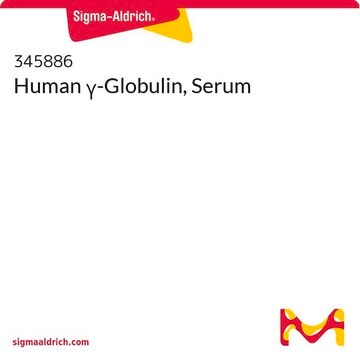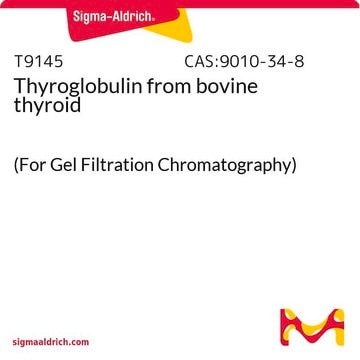SRE0011
γ-Globulins from bovine blood
Suitable for manufacturing of diagnostic kits and reagents, ≥99% (agarose gel electrophoresis)
Sinónimos:
Bovine γ-Globulin
Iniciar sesiónpara Ver la Fijación de precios por contrato y de la organización
About This Item
Productos recomendados
Quality Level
assay
≥99% (agarose gel electrophoresis)
form
powder
composition
NaCl, ≤4%
application(s)
diagnostic assay manufacturing
shipped in
wet ice
storage temp.
−20°C
¿Está buscando productos similares? Visita Guía de comparación de productos
General description
γ-Globulins are immunoglobulins that contain IgM, IgA, and IgY. They are glycoproteins produced by plasma cells. The immunoglobulins are heterodimeric molecules comprising two light chains and two heavy chains linked together by disulfide bonds.
Bovine gamma globulin (BGG) is an important component of the immune system of cows and other bovines. BGG is found in the blood of bovines and is primarily used in the production of medical products such as vaccines, serums, and diagnostic reagents. BGG can also be used to treat certain medical conditions, such as hepatitis B, as well as to boost immunity in humans and other animals.
Application
γ-Globulins from bovine blood has been used along with polyethylene glycol (PEG) to investigate the kinetics of liquid-liquid phase separation (LLPS) in its temporary and arrested state. It has also been used as a parent solution to prevent bacterial growth and study the antibody system with LLPS and highly elevated protein concentrations in arrested transition.
Bovine γ-globulin has been used as an immunological challenge in studies of mechanisms of immunotolerance.
Biochem/physiol Actions
Immunoglobulins are implicated in the activation of the complement system and the opsonization of microbes for phagocytosis. It is also involved in the neutralization of toxins and viruses and blocks the attachment of microbes to mucosal surfaces. They protect our bodies against fungi, viruses, and bacteria. Immunodeficiency is associated with recurrent infectious diseases.
Preparation Note
Prepared from Cohn Fraction II, III
Storage Class
11 - Combustible Solids
wgk_germany
WGK 3
flash_point_f
Not applicable
flash_point_c
Not applicable
Certificados de análisis (COA)
Busque Certificados de análisis (COA) introduciendo el número de lote del producto. Los números de lote se encuentran en la etiqueta del producto después de las palabras «Lot» o «Batch»
¿Ya tiene este producto?
Encuentre la documentación para los productos que ha comprado recientemente en la Biblioteca de documentos.
Los clientes también vieron
Blood
Sturkie's Avian Physiology, 167-191, 167-191 (2015)
Justiz Vaillant AA, et al.
Immunoglobulin (2021)
Anita Girelli et al.
Molecular pharmaceutics, 18(11), 4162-4169 (2021-10-13)
Antibody therapies are typically based on high-concentration formulations that need to be administered subcutaneously. These conditions induce several challenges, inter alia a viscosity suitable for injection, sufficient solution stability, and preservation of molecular function. To obtain systematic insights into the
Stefano Da Vela et al.
Soft matter, 13(46), 8756-8765 (2017-11-14)
We investigate the transition of the phase separation kinetics from a complete to an arrested liquid-liquid phase separation (LLPS) in mixtures of bovine γ-globulin with polyethylene glycol (PEG). The solutions feature LLPS with upper critical solution temperature phase behavior. At
Harry W Schroeder et al.
The Journal of allergy and clinical immunology, 125(2 Suppl 2), S41-S52 (2010-03-05)
Immunoglobulins are heterodimeric proteins composed of 2 heavy and 2 light chains. They can be separated functionally into variable domains that bind antigens and constant domains that specify effector functions, such as activation of complement or binding to Fc receptors.
Nuestro equipo de científicos tiene experiencia en todas las áreas de investigación: Ciencias de la vida, Ciencia de los materiales, Síntesis química, Cromatografía, Analítica y muchas otras.
Póngase en contacto con el Servicio técnico














